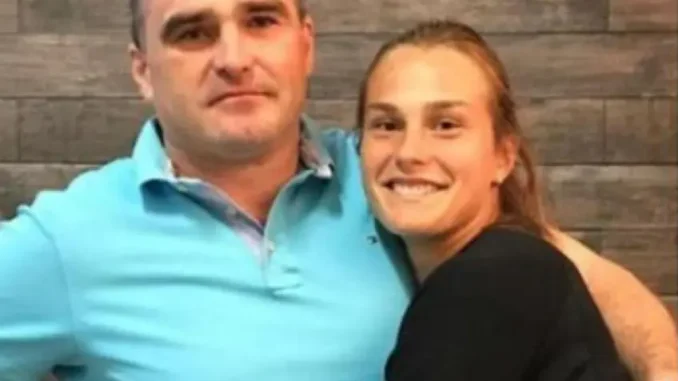
the world of professional tennis, Aryna Sabalenka stands out not only for her formidable presence on the court but also for her resilience in the face of personal tragedy. Belarusian athlete has recently shared insights into how she coped with the sudden loss of her father, Sergey Sabalenka, who passed away in 2019 at the age of 43 due to meningitis. Thvent profoundly impacted her life and career, leading her to seek solace in private rituals and a deeper connection to her inner self.
Sabn has always been known for her openness, frequently sharing aspects of her life with fans and the media. Howevere grief stemming from her father’s untimely death prompted her to adopt more intimate forms of remembrance. In a candnterview, she revealed, “I’m really open. But I have to say, when I lost my dad, from time to time, I would go to the church and put a candle for his memory and the memory of my grandfather. It’s something you never show on social media. I’m not gonna be the one in the church filming.” This statemunderscores her desire to keep certain personal moments sacred, away from the public eye.
The act of ltg candles in church became a significant part of Sabalenka’s grieving process. While she does nonsider herself deeply religious, these visits provided her with a sense of peace and a way to honor her father’s memory. This private ritualowed her to navigate her grief on her own terms, without the scrutiny that often accompanies public figures.
The loss of her fat s not the only personal tragedy Sabalenka faced. In March 2024, her ex-biend, former NHL player Konstantin Koltsov, died unexpectedly. Reflecting on this periodbalenka admitted that her initial response was to immerse herself in tennis, a strategy she had previously employed after her father’s death. She explained, “Once, I los father and tennis helped me to go through that tough loss. So at that moment [of Koltsov’s death] I thought I had to just keep going, keep playing, keep doing my thing to separate my personal life from my career life.”
However, Sabalenka later recid that this approach, while initially helpful, had its drawbacks. She acknowledged, “Probably, loo back right now, I would say that a better decision would have been to step back, reset and recharge, and start everything over again. But I did what I did. At the end I paid for my decision, but I’m really glad that I have tennis in my life and it’s really helped me go through whatever and get stronger.” This reflection highlights the com interplay between personal grief and professional responsibilities, especially for athletes at the highest levels of competition.
The pressure to maintain peak perfon can often lead athletes to suppress their emotions, focusing solely on their sport as a coping mechanism. Sabalenka’s experience sheds light on tmportance of acknowledging grief and allowing oneself the time to heal, even amidst the demands of a professional career.
In the years following her father’s deatSalenka’s career has been marked by significant achievements and challenges. She secured her first Grand Slam title at thstralian Open in 2023, a victory she dedicated to her late father. After her win, she was seen blowing a kiss to heavens, a gesture that resonated deeply with fans and highlighted the personal significance of her triumph.
However, the journey was not without its hurdleSalenka faced difficulties with her serve, leadin a series of double faults that affected her performance in several tournaments. These struggles were compounded by the emotional tollher personal losses, testing her mental fortitude.
Despite these challenges, Sabalenka demonstrated remarlresilience. She worked diligently to overcome her serving issues, seekguidance from coaches and sports psychologists to rebuild her confidence. Her perseverance paid off, culminating in a strong performant the US Open, where she reached the semifinals.
Throughout these experiences, Sabalenka has been mindful of mtning a balance between her public persona and private life. While she remains active on social media, sharing updates about hatches and training, she chooses to keep certain aspects of her personal life, particularly those related to her grief, away from the public eye. This deliberate separation allows her to process her emotions withoxternal pressures or expectations.
Sabalenka’s story offers valuable insights into the challenges athle ce when dealing with personal loss. It underscores the importance of mental health and the need for support ems that allow individuals to grieve and heal. Her openness about her struggles serves as a reminder that seeking help anking time for oneself are crucial steps in navigating the complexities of life and sport.
As Sabalenka continues her career, she carries with her the lessons learnedoher experiences. Her journey is a testament to the strength of the human spirit and the enduringer of personal rituals in providing comfort during times of grief. By honoring her father’s memory in her own way, she exemplifies the resilience antermination that define her both as an athlete and as an individual.
In conclusion, Aryna Sabalenka’s reflections on her father’s passing and her subsencoping mechanisms offer a profound look into the personal challenges faced by professional athletes. Her story highlights the delicate balance between maintaining public appearances and assing private grief, emphasizing the importance of personal rituals and mental health awareness. Through her candidness, Sabalenka provides inspiration and insight into the human side ompetitive sports, reminding us all of the strength found in vulnerability and the healing power of personal connection.
Leave a Reply